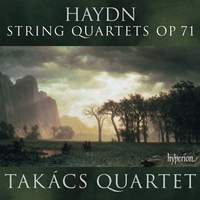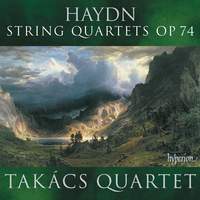Recording of the Week,
Haydn from the Takács Quartet
Like Paul Lewis last week, this week’s featured artists have also enjoyed considerable success at the Gramophone Awards with their recordings of Beethoven. The Takács Quartet’s Beethoven recordings for Decca are without doubt amongst the finest in the catalogue. They picked up two Gramophone Chamber Category Awards and were greeted with widespread critical success all over the world. Since then the Takács Quartet have continued to go from strength to strength and last week released their 5th and 6th discs with Hyperion – of Haydn’s Opus 71 and Opus 74 Quartets respectively.

I have been particularly looking forward to these discs since I spent a hugely enjoyable day at the recording sessions last November. It was an eye-opening experience for me, and one that I will long remember. It had all came about a bit by chance. I had noticed that in award speeches artists would invariably thank their producer and the name ‘Andrew Keener’ seemed to be coming up with regular frequency! I assumed therefore he must be rather good at his job, but still wasn’t quite sure exactly what his job was and in particular what qualities, other than presumably good ears, would make him good at it! So when I bumped into Andrew last autumn at a Hyperion party and he invited me along to a session, I was delighted.
I chose a day of the Takács Quartet Haydn sessions as I suspected that it would be a little less stressful than a big orchestral session (so I could ask him lots of questions), and I also thought that musically it would be terrific way to spend a day having been long admirers of the Quartet. I arrived early, met the Recording Engineer: Simon Eadon, and soon afterwards the Quartet themselves. Simon had spent many years on the staff at Decca and it was he who during the breaks that day explained to me a lot of the Decca philosophy of recording which went into the ‘Decca Sound’ newsletter a few weeks ago.
During the session the engineer is responsible for actually capturing the sound, while the producer really runs the session. The plan for the day I was there was to put down the whole of the Op 74 No. 2 Quartet which basically meant 5 or 6 hours to record just over twenty minutes music. Sounds easy, but once you’ve played a movement through, listened back, played it again, maybe listened again, put down one or two complete takes, then gone back over it section by section fixing details, it certainly didn’t feel like a luxury, even for a quartet as outstanding as the Takács.
The Quartet clearly had complete trust in Andrew and I could quickly see why. He has a remarkable ability to listen both vertically and horizontally, could pinpoint any detail of attack, balance, intonation or sonority but also contribute to phrasing and other musical points. If he didn’t feel a certain phrasing or dynamic contrast was clear enough he would ask if that was their intention and invariably they would realise they had to be slightly more obvious. Equally important was his ‘people skills’. He was able to create an atmosphere that was both relaxed, but in which they could also produce their best. I chatted to the Quartet over dinner in the evening and – apart from the very pleasing discovery that Edward Dusinberre (the first violin) buys his CDs from us – they echoed everything which I’d noticed during the day, and were clearly delighted with the way the sessions were going and looking forward to the results.
That seems a long time ago now, but the wait is well worth it, as these are terrific discs. The recordings took place at the Wyastone Estate Concert Hall in Monmouth, South Wales, and the sound captured here is rich and rounded, but with no shortage of clarity and detail. These details are what makes the difference in the faster and wittier movements, with bravura passagework for all instruments tossed off with real style and panache. There is also something really special about the slower movements where the Quartet achieve some really beautiful sonorities, and passages where Edward Dusinberre’s first violin floats effortlessly above the lower trio are simply magical. There is much to enjoy here and sound samples are available as usual via the links below.
Takács Quartet
Available Formats: CD, MP3, FLAC
Takács Quartet
Available Formats: CD, MP3, FLAC




